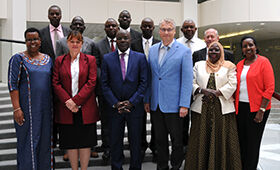BIBB hosts government delegation from Uganda
How does dual vocational education and training work in Germany? How are vocational standards developed? What role do social partners play? Alex Kakooza, Permanent Secretary from Uganda, learned about the core elements of vocational training under the dual system in Germany at the Federal Institute for Vocational Education and Training (BIBB).

On 23 April 2018, BIBB President Friedrich Hubert Esser welcomed a high-ranking delegation from Uganda led by Permanent Secretary Alex Kakooza from the Ministry of Education and Sports. “Africa is an emerging continent with great potential. For Germany – and in particular for the BIBB – cooperation with African states, especially in areas such as education and research, is of huge significance. We very much welcome the fact that Uganda is interested in the dual system of vocational education and training and is using the German experience to help develop its future training provision. Vocational education and training provides young people with options as they plan and organise their future path in life. It is worth investing in vocational education and training for this reason,” emphasised Esser in his address.
Hannelore Kress from the German Office for International Cooperation in Vocational Education and Training (GOVET) at the BIBB then provided the Ugandan government delegation with information about the BIBB's role in vocational education and training and about the core elements of VET in Germany.
“Africa is an emerging continent with great potential,” explained BIBB president Esser.
In the discussion which followed, the guests from Uganda were extremely interested in the BIBB’s work as an interface between government, industry and social partners and in the role it plays in developing training regulations and standards.
The transferability of the German system in Uganda was also considered in more detail with respect to training and subsequent employment. Interest was shown and questions asked on the subject of master craftsperson training and on the extent to which opportunities exist for getting young people into training.
The visit by the delegation from Uganda to the BIBB was arranged by the Cologne Chamber of Crafts and Trades, which has been involved for many years in partnership projects in Africa. The Cologne Chamber of Crafts and Trades contributes to these projects with their experience in the area of vocational education and training, training at the workplace, and SME support. The projects themselves are funded by the Federal Ministry of Economic Cooperation and Development (BMZ) via sequa gGmbH. In Uganda, training provision in the areas of woodworking, metal working, electronics and sanitation is focused on the needs of the local economy with support from the Cologne Chamber of Crafts and Trades.